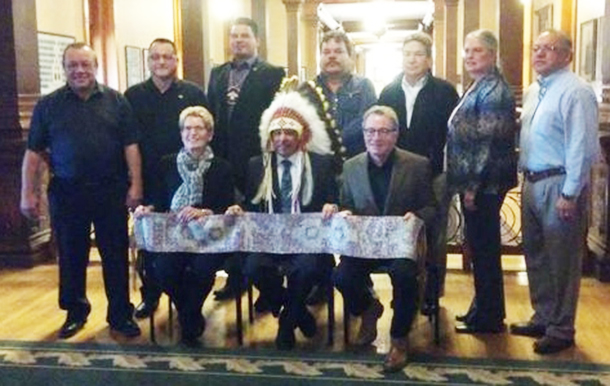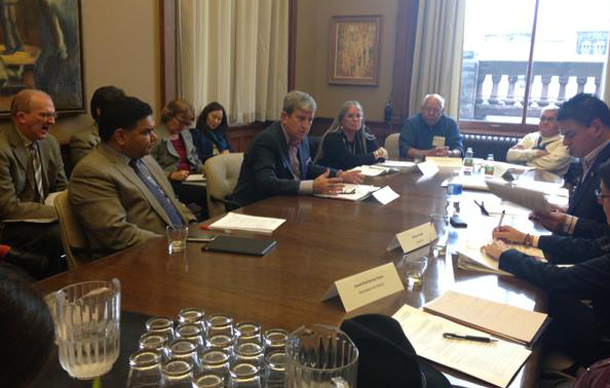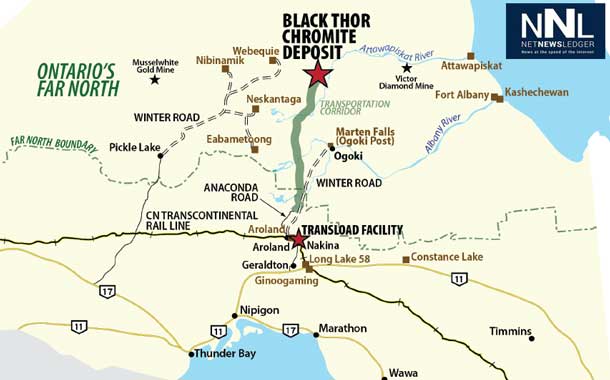
Focused Meetings Lead to Agreement to Move Forward
TORONTO – ANISHINABEK – Ontario Regional Chief and Grand Chiefs met with Premier Kathleen Wynne and members of her Cabinet Friday morning following three days of focused dialogue between First Nations leaders and the Province. First Nations leaders are calling the time well spent and a clear signal that the Province is willing to move forward on addressing critical issues in First Nation communities.
“Our chiefs called these meetings in order to reset the relationship with the province. Ontario has responsibilities to the treaties which must be honoured, and we are committed to working with them in a meaningful way,” Regional Chief Stan Beardy said. “Over the past three days, our Chiefs covered many topics and priorities from education and health to murdered and missing women.”

First Nations leaders presented a proposal to the Premier titled ‘Polishing the Chain’ to outline a commitment to renewing the relationship between both parties. The term ‘Polishing the Chain’ references the Covenant Chain of Friendship which was extended to all parties at the Treaty of Niagara, 1764.
“We had a frank exchange with the Premier,” said Grand Chief Gord Peters of the Association of Iroquois and Allied Indians. “In the end, we agreed to undertake fundamental discussions which will strengthen our relationship. This kind of dialogue is necessary to affirm real change.”
Premier Wynne agreed that the relationship between the Province and First Nations was vital and committed to meeting again in January 2015 to identify a process for working together. She also committed to moving forward on agreed actions from the roundtables including developing a treaty awareness day in partnership with First Nations.
Topics of discussion also included resource benefit/revenue sharing, treaty awareness, mental health promotion, palliative and long-term care, clean drinking water, education, poverty alleviation, and missing and murdered Indigenous women.

Summary of Discussions
Resource Benefit and Revenue Sharing
Ministers: Northern Development and Mines, Natural Resources and Forestry, Aboriginal Affairs
First Nations do not currently receive benefits or revenues from resources that are developed by companies on traditional lands. The government has expressed openness to creating a system for resource benefit and revenue sharing for some time, but past dialogue has yet to produce a comprehensive plan.
Treaty Awareness
Ministers: Aboriginal Affairs
This meeting followed a statement made by Minister Zimmer in the provincial legislature on Wednesday. His statement committed the province to moving forward on the development of a Treaty Awareness Day. First Nations leaders are supportive of treaty education initiatives, but stress that First Nations need to be an equal partner in the process.
Mental Health and Youth Life Promotion
Ministers: Children and Youth Services, Health and Long-Term Care
Minister MacCharles is mandated to implement a Youth Suicide Prevention Initiative. This three-year plan will help communities build capacity to better respond to young people in crises. Ontario Chiefs will be encouraging the Minister to swiftly implement this initiative, and to also ensure First Nations leaders are an integral part of the process. The key issue being raised at this table is ensuring that the strategy is culturally inclusive for First Nations youth – a demographic that has the highest youth suicide rates across the country.
Palliative and Long-Term Care
Ministers: Health and Long-Term Care, Seniors Affairs
Health and long-term care is a priority service delivery area for first Nations. Current concerns include limited long-term care options in First Nations communities, as well as jurisdictional issues which impede service delivery for elders. This table will explore joint solutions between First Nations and the province.
Clean Drinking Water
Ministers: Environment and Climate Change; Economic Development, Employment and Infrastructure
There are 50 First Nations communities in Ontario under boil water advisories, and another 10 which are under do not consume orders. Some communities have not had potable water for more than a decade. The province of Ontario is seeking ways to improve on-reserve access to safe drinking water outside of the legislation imposed by the federal government. Ontario and First Nations are looking to build a better relationship by expanding on current initiatives.
Education
Ministers: Education
Chiefs will stress the importance of addressing the gaps in education for First Nations students in a culturally competent way. Key issues include a lack of adequate resources, teachers with limited understanding of Indigenous history and issues, and an achievement gap in First Nations students. Ontario Chiefs uphold that control of education needs to rest within the jurisdiction of First Nations.
Poverty Alleviation through Business Development
Ministers: Research and Innovation; Economic Development, Employment and Infrastructure
First Nations face significant financial and infrastructure barriers that prevent businesses on reserve from succeeding. These barriers include prohibitively high energy costs on-reserve, unpredictable government funding and programs, limited access to start-up funding, and infrastructure deficits.
Missing and Murdered Indigenous Women
Ministers: Community Safety and Correctional Services, Minister responsible for Women’s Issues
First Nations women are murdered or go missing at an unacceptably high and over-represented rate. The First Nations Women’s Caucus will recommend that the Province of Ontario support education on family violence and sexual assault prevention, a needs assessment on family violence programs, police training initiatives, and public education on colonial racism and gender-based violence.





